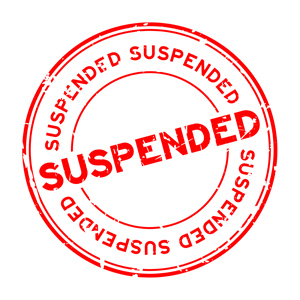Footnote: I was living in Memphis on April 14, 1986, U.S. Department of Labor Chief Administrative Law Judge Nahum Litt (1979-1995) sent me a lovely letter, offering me a clerkship. I accepted. My life has been different as a result. He encouraged me to stand up to oppression. After my clerkship, I was honored to represent ethical employees, including nine (9) federal administrative law judges who stood up for judicial independence -- referred to me by Judge Litt, including his wife,
Chief Judge Litt died last year, retired to New Smyrna Beach, Florida where he inveighed against corruption. He would have been incensed at the behavior of unconfirmed Florida Chief ALJ JOHN MacIVER, some hobbledehoy in Governor RONALD DION DeSANTIS' employ, who reached out to crush judicial independence. I am incensed, too.
ALJs don't have bosses. ALJs are supposed to be independent. Judge John Van Laningham is right. These were ex parte contacts. We, the People have a Right to Know.
I'm asking for disclosure of all such ex parte contacts. We have a Right to Know.
From ABA Journal:
Administrative law judge is accused of insubordination and suspended for footnotes

Image from Shutterstock.com.
A Florida administrative law judge was suspended by his agency for five days because of footnotes.
Administrative Law Judge John Van Laningham was suspended for alleged “insubordination and misconduct,” the News Service of Floridareports. He is a judge with the Florida Division of Administrative Hearings.
The footnotes concerned John MacIver, the chief judge and division director, and his habit of reviewing judges’ opinions before they are issued. MacIver was appointed to his position in October 2019.
According to the News Service of Florida, Van Laningham “is renowned for lengthy, sharply written orders in which he sometimes harshly rebukes state agency officials.” He plans to appeal the suspension.
MacIver issued notice of the suspension March 27, according to Van Laningham’s lawyer, Daniel Bean. The suspension took effect April 1.
Van Laningham’s decision involved a claim that Florida wagering authorities had renewed slot machine licenses for a horse racing track, even though it no longer had the kind of “live gaming facility” required for such licenses.
In footnote No. 10, Van Laningham said MacIver has been making comments and suggesting edits in judges’ opinions.

Judge John Van Laningham. Image from the Florida Division of Administrative Hearings.
The footnote questioned whether MacIver’s comments might be ex parte communications that are banned by Florida law.
Van Laningham listed MacIver’s comments in footnote Nos. 10 and 11. In one comment, MacIver said, “This is the crux of your most defensible finding.” Another comment said, “Finding the agency’s future intent as a matter of fact is troubling.”
Van Laningham’s footnote No. 10 said he was “erring on the side of caution and disclosure” by placing MacIver’s comments on the record. Any party wishing to rebut the communication may do so under Florida law, Laningham said.
Administrative Law Judge Lisa “Li” Shearer Nelson had recommended the suspension on March 26, and Administrative Law Judge Gar Chisenhall concurred.
Nelson said Van Laningham was wrong to suggest that MacIver’s comments were ex parte communications because the ban on such communications applies to parties in litigation and not to a more senior judge.
Nelson also said Van Laningham should have raised his concerns with his supervisor or chief judge if he thought the review process is improper.
Bean argued that Van Laningham’s only intent was to disclose the communications, and he did nothing wrong.
“Transparency and independence are critical in our legal decision-making process,” Bean said in a comment emailed to the ABA Journal.
“If a judge, statutory or constitutional, is receiving unsolicited substantive comments, the litigants deserve to know that and have an opportunity to respond to the ex parte communication,” Bean said.
“Judge Van Laningham was neither insubordinate nor committed any misconduct; rather, he refused to maintain the conspiracy of silence promoted by the director. The director is permitted to assign himself to a case and exercise his own independent authority as an administrative law judge, but attempting to shield his substantive participation, and then punishing another when it is properly disclosed, is wrong.”
Updated at 2:05 p.m. to report that MacIver issued the suspension notice March 27.
From News Service of Florida via Miami Herald:
Florida judge is suspended for ‘insubordination’ in footnotes he wrote about his boss

A state Division of Administrative Hearings judge has been suspended for accusing the agency’s director of making what are known as improper “ex parte communications” when reviewing an order in a case about a South Florida horse track.
The five-day suspension of Administrative Law Judge John Van Laningham for “insubordination and misconduct,” which was effective Wednesday, sent shockwaves through the state’s tightly knit administrative-law community.
Van Laningham, who intends to appeal the sanction, was appointed to serve as a judge at the division 20 years ago. He is renowned for lengthy, sharply written orders in which he sometimes harshly rebukes state agency officials.
The suspension of an administrative law judge and the public scrutiny are extremely rare at the agency, which handles cases ranging from big-money fights involving gambling operators and medical-marijuana companies to a dispute about bakers who refused to make a pastry with an anti-gay slogan.
Van Laningham’s sanction, issued by Administrative Law Judges Li Nelson and Gar Chisenhall on March 26, stemmed from two footnotes he included in a March 13 recommended order in a case involving Calder Race Course Inc.
The footnotes said division director John MacIver, who is also the chief judge, began reviewing judges’ orders and making comments about them before they were rendered. MacIver instituted the reviews shortly after his October appointment as director by Gov. Ron DeSantis and the Florida Cabinet.
Van Laningham’s footnotes also raised questions about whether MacIver’s comments “are, or might be, ex parte communications prohibited by” a section of Florida administrative law. An ex parte communication generally involves someone discussing a case with a judge without the knowledge of each party in the case.
Van Laningham wrote that he was “erring on the side of caution” by placing the comments on the record, adding that “any party desiring to rebut this communication shall be allowed to do so in accordance with” the statute.
The footnotes created a firestorm not only within the legal community, but also among Van Laningham’s colleagues.
Senior Administrative Law Judge Robert Cohen, who was the division’s chief judge for more than two decades until MacIver’s appointment last year, said he was “shocked” by Van Laningham’s comments.
The discussion between the chief judge and an administrative law judge “does not constitute ex parte communications contemplated by the Legislature,” Cohen, who is Van Laningham’s supervisor, wrote in a March 19 memo to MacIver.
“To the contrary,” Cohen continued, “I believe this practice is an excellent management tool for understanding the depth and breadth of matters coming before” the Division of Administrative Hearings as well as a way to determine whether the administrative law judges are “consistent in their decision-making” and “acting in accordance with” state law.
“In retrospect, I wish I had made the effort to conduct such frequent reviews when I was director,” he added.
Van Laningham’s interpretation is “misplaced, convoluted, and either masquerading as a complaint or an attack against the director who is making an effort to ensure quality orders are issued by” the division, Cohen added.
But Daniel Bean, a lawyer representing Van Laningham, argued that the judge has no personal animus toward MacIver and had not done anything wrong.
“These conclusions regarding Judge Van Laningham’s personal motivations are conclusory, unsupported, and untrue,” Bean wrote March 24, asking that the intended punishment be rescinded.
His “sole intent,” rather, “was to disclose to the litigants communications which he believed were relative to the merits and which he had a statutory duty to disclose,” Bean wrote.
The division’s “decidedly negative reaction to Judge Van Laningham’s truthful disclosure of a public record in the interests of full transparency to the litigants is both puzzling and concerning,” Bean wrote.
Van Laningham’s lawyer also argued that the charges of misconduct and insubordination are unfounded, noting repeatedly that the comments in the footnote were neutral.
“It is highly concerning that [the Division of Administrative Hearings] appears to take the position that an [administrative law judge] is prohibited from exercising his independent decision-making authority to analyze and interpret a statute and determine its applicability,” particularly when the statute creates a personal obligation for the judge to undergo that analysis or face a civil sanction, Bean argued.
But, in the March 26 recommendation to suspend Van Laningham, Nelson wrote that the standard definitions of ex parte communication “simply do not align” with Van Laningham’s interpretation, in part because MacIver is not a party to the litigation.
“Moreover, to reach this conclusion would mean that each comment resulting from a review of a recommended or final order by a senior judge would also qualify as an ex parte communication, including the countless orders that Judge Van Laningham reviewed in that capacity,” Nelson wrote in the three-page recommendation. “Respectfully, I cannot find that this view is a good faith, reasonable, or well-founded belief.”
Nelson also found it was not the disclosure of the review policy that was problematic. Instead, “it is the characterization of the review as an ex parte communication, which by definition means an attempt to influence the presiding officer to benefit one party over another” that is troubling, she added.
Nelson acknowledged that “there may be differing reactions” among the Division of Administrative Hearings judges “regarding this extra layer of review.”
But the process has been in place for several months, she added. If Van Laningham felt that the process was improper, “it was incumbent upon him” to address the issue with his supervisor and/or the chief judge, rather than using footnotes.
“It is difficult to reach this conclusion, because both Judge Chisenhall and I respect Judge Van Laningham’s legal acumen. We do not take this action lightly. It is that same stellar ability that undermines his assertion that he truly believed Judge MacIver’s comments to be ex parte communications,” Nelson concluded.
Jackie Van Laningham, a lawyer who is the judge’s daughter and who works for Bean, told The News Service of Florida on Friday that her father intends to appeal the suspension to the Public Employee Relations Commission.
“There was no intent to attack the director’s practice,” she said. “We’ll move forward, but obviously our position is there was no misconduct or insubordination and no directive or order that was violated.”
MacIver’s appointment as director of the division last year drew some controversy, with Agriculture Commissioner Nikki Fried opposing the appointment. She argued that MacIver lacked the experience necessary for the post. MacIver has been a member of The Florida Bar for eight years.
I
MacIver, who at the time was the head of the local Federalist Society, told DeSantis and the Cabinet in September that his goal would be to hire “the correct [judges] who have the correct judicial philosophy,” one that he called apolitical. The Federalist Society in Florida and nationally is perhaps the most-prominent conservative legal organization.
“The Legislature should be able to look to both the courts and the administrative courts and say I can write a law … and there aren’t going to be creative ways to try to redraft that,” MacIver said.
No comments:
Post a Comment